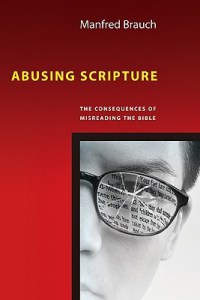
Abusing Scripture: The Consequences of Misreading the Bible, Manfred T. Brauch. Downers Grove, IL: InterVarsity Press, 2009.
Summary: The author explores the different ways we misread the Bible and consequently interpret and apply it in ways that abuse both the intent of the text, and sadly, in some cases the people with whom we apply these texts.
I teach the Bible in my work, and on occasion, in the congregation of which I am a part. That is both an exciting and sobering opportunity for me. One one hand I believe that I am explaining what God has said through human beings, and that this can be powerfully transformative in lives. On the other hand, I am keenly aware that how I explain and apply a text can either lead people to such transformative encounters with the living God, or mislead them. I’m always mindful of James’ comment that “we who teach will be judged more strictly” (James 3:1, NIV).
Manfred Brauch is concerned that we might in fact abuse the scriptures in our mishandling of them. This is strong language which he defends in his opening chapter by the fact that we may well do violence to the intent of the text by our mishandling of it. And this violence in turn may warp the understanding of Christian truth by those who hear such teaching, and may, often unintentionally, result in causing others in the Christian community deep pain, or in misrepresenting the message of Christ.
He begins by focusing on the nature of scripture and argues that it is both intentional and incarnational and that abuse occurs when we ignore either the intent of the Bible or its incarnational character, both as the word of God and as given to particular people in a particular cultural context. In succeeding chapters Brauch six ways we mishandle scripture in our interpretation and application:
- The abuse of the whole gospel. We may tend toward a focus on a gospel of personal salvation or a social gospel, focusing on the redemptive work of Jesus and its impact on overcoming injustice and setting right the structures of society. Neither alone are the whole message of scripture.
- The abuse of selectivity. It is often observed that differing positions on an issue like gender roles can both cite scripture for their view. The issue often is selective use of scripture, ignoring passages that may not agree with one’s view. Often, we need to listen to all the relevant texts and look particularly for those that reflect the overarching redemptive trajectory of scripture.
- The abuse of biblical balance. This differs from the abuse preceding it in overemphasis on a particular doctrine while under-emphasizing others. We may focus on certain sins while ignoring others. Again, we need to hear all these perspectives and consider a both/and rather than either/or approach.
- The abuse of words. Most of us read, and certainly preach the Bible in translation. Care must be used to be certain that the words we use and meanings we attribute to a word accurately reflect what the author would have understood, as best as we can ascertain. Brauch uses as an example the word cephale and argues for how our translations as “head” may ignore the dimension of “headship” that has to do with “source” and instead uses the term hierarchically.
- The abuse of context, both literary and theological. Literary context concerns the place of a particular passage in a larger narrative. Theological context has to do with relating a particular theological idea to the larger theological themes of a book, or even all the books of a particular writer, like Paul.
- The abuse of context, relating to historical context and cultural reality. We may universalize what is particular to a historical context or assume that teaching in a context must be applied in the same way in very different cultural contexts-for example, how we understand Jesus healings on the sabbath and the implication for early Christians of whether and how to carry over Jewish sabbath practices.
He then concludes by considering what it could mean if those who differ over scripture and give weight to one part while ignoring others would simply begin to listen to the witness of each other. And he includes appendices going deeper on selective issues of interpretation. And most helpful throughout is that Brauch illustrates both abuses and the proper handling of scripture using contemporary issues.
This book is important for anyone who teaches the scriptures and seeks to be thoughtful of engaging the disparate views one encounters with others who may even claim a similar, evangelical faith. It advocates neither a culture war nor expulsion of those who differ, but the engagement that takes both the scriptures and our hearers seriously. Church leaders facing sharp doctrinal challenges might read this to think through how this might be approached both irenically and yet with doctrinal integrity.
Editor’s Note: Thank-you to Bob Trube for sharing his reviews with Emerging Scholars! Bob first posted the above review on Bob on Books. ~ Thomas B. Grosh IV, Associate Director, Emerging Scholars Network
Bob Trube is Associate Director of Faculty Ministry and Director of the Emerging Scholars Network. He blogs on books regularly at bobonbooks.com. He resides in Columbus, Ohio, with Marilyn and enjoys reading, gardening, choral singing, and plein air painting.

Leave a Reply